Analyzing Liabilities: A Business & Corporation Law Case Study
VerifiedAdded on 2023/06/07
|8
|2270
|113
Case Study
AI Summary
This case study analyzes the liabilities of companies and partnerships under Australian law, particularly the Corporations Act 2001 (Cth) and the Partnership Act 1892 (NSW). The first scenario examines whether Steve, as a promoter of WA Gold Exploration Company, is personally liable for a pre-registration contract with Thor Mining Machinery Ltd. Applying the principles from Salomon v Salomon & Co Ltd and Kelner v Baxter, it concludes that Steve is liable due to the company's failure to rectify the contract. However, he is not personally liable for the company's debt to Volvo Trucks (Australia) Ltd. The second scenario assesses the liability of partners in a firm involving Simon, George, Sara, and Mary, focusing on contracts with Sunstar Computer Hardware and You Beaut Ute Ltd. Utilizing sections from the Partnership Act and cases like Mercantile Credit Ltd v Garrod, it determines that while all partners are liable for the Sunstar contract, only Simon is liable for the You Beaut Ute Ltd contract due to exceeding his authority. Desklib offers similar solved assignments and past papers for students.

Business and Corporation Law
Paraphrase This Document
Need a fresh take? Get an instant paraphrase of this document with our AI Paraphraser
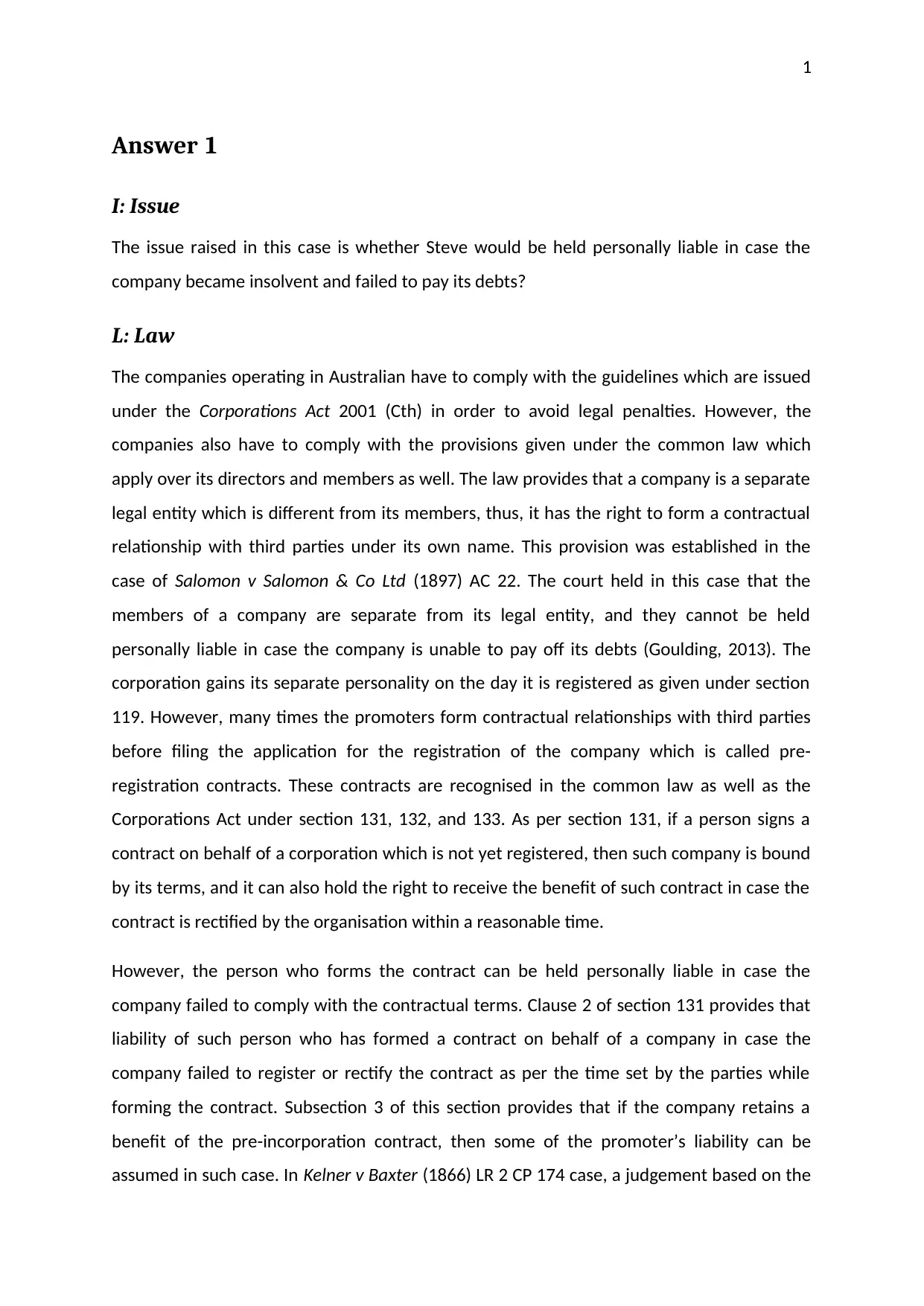
1
Answer 1
I: Issue
The issue raised in this case is whether Steve would be held personally liable in case the
company became insolvent and failed to pay its debts?
L: Law
The companies operating in Australian have to comply with the guidelines which are issued
under the Corporations Act 2001 (Cth) in order to avoid legal penalties. However, the
companies also have to comply with the provisions given under the common law which
apply over its directors and members as well. The law provides that a company is a separate
legal entity which is different from its members, thus, it has the right to form a contractual
relationship with third parties under its own name. This provision was established in the
case of Salomon v Salomon & Co Ltd (1897) AC 22. The court held in this case that the
members of a company are separate from its legal entity, and they cannot be held
personally liable in case the company is unable to pay off its debts (Goulding, 2013). The
corporation gains its separate personality on the day it is registered as given under section
119. However, many times the promoters form contractual relationships with third parties
before filing the application for the registration of the company which is called pre-
registration contracts. These contracts are recognised in the common law as well as the
Corporations Act under section 131, 132, and 133. As per section 131, if a person signs a
contract on behalf of a corporation which is not yet registered, then such company is bound
by its terms, and it can also hold the right to receive the benefit of such contract in case the
contract is rectified by the organisation within a reasonable time.
However, the person who forms the contract can be held personally liable in case the
company failed to comply with the contractual terms. Clause 2 of section 131 provides that
liability of such person who has formed a contract on behalf of a company in case the
company failed to register or rectify the contract as per the time set by the parties while
forming the contract. Subsection 3 of this section provides that if the company retains a
benefit of the pre-incorporation contract, then some of the promoter’s liability can be
assumed in such case. In Kelner v Baxter (1866) LR 2 CP 174 case, a judgement based on the
Answer 1
I: Issue
The issue raised in this case is whether Steve would be held personally liable in case the
company became insolvent and failed to pay its debts?
L: Law
The companies operating in Australian have to comply with the guidelines which are issued
under the Corporations Act 2001 (Cth) in order to avoid legal penalties. However, the
companies also have to comply with the provisions given under the common law which
apply over its directors and members as well. The law provides that a company is a separate
legal entity which is different from its members, thus, it has the right to form a contractual
relationship with third parties under its own name. This provision was established in the
case of Salomon v Salomon & Co Ltd (1897) AC 22. The court held in this case that the
members of a company are separate from its legal entity, and they cannot be held
personally liable in case the company is unable to pay off its debts (Goulding, 2013). The
corporation gains its separate personality on the day it is registered as given under section
119. However, many times the promoters form contractual relationships with third parties
before filing the application for the registration of the company which is called pre-
registration contracts. These contracts are recognised in the common law as well as the
Corporations Act under section 131, 132, and 133. As per section 131, if a person signs a
contract on behalf of a corporation which is not yet registered, then such company is bound
by its terms, and it can also hold the right to receive the benefit of such contract in case the
contract is rectified by the organisation within a reasonable time.
However, the person who forms the contract can be held personally liable in case the
company failed to comply with the contractual terms. Clause 2 of section 131 provides that
liability of such person who has formed a contract on behalf of a company in case the
company failed to register or rectify the contract as per the time set by the parties while
forming the contract. Subsection 3 of this section provides that if the company retains a
benefit of the pre-incorporation contract, then some of the promoter’s liability can be
assumed in such case. In Kelner v Baxter (1866) LR 2 CP 174 case, a judgement based on the
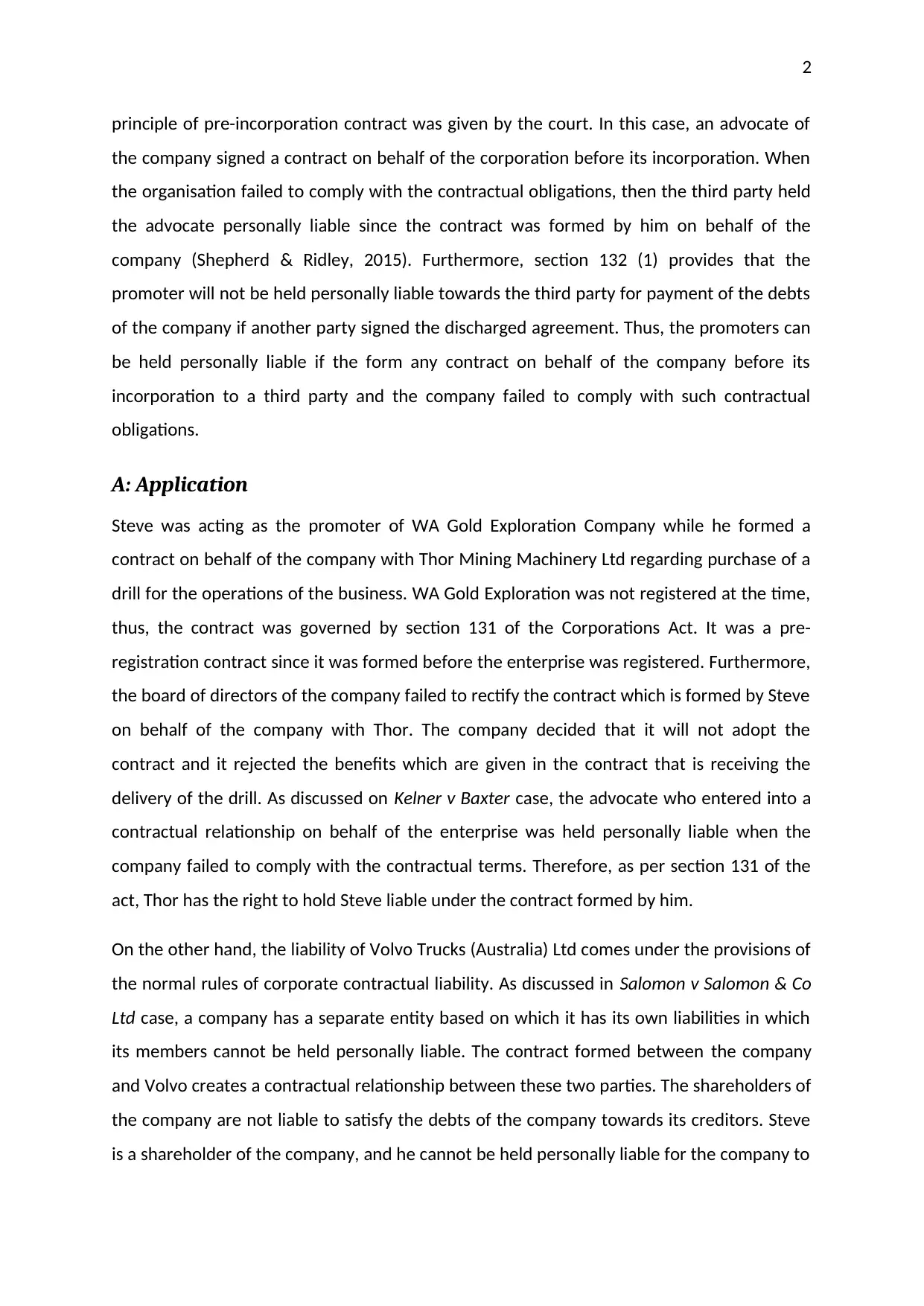
2
principle of pre-incorporation contract was given by the court. In this case, an advocate of
the company signed a contract on behalf of the corporation before its incorporation. When
the organisation failed to comply with the contractual obligations, then the third party held
the advocate personally liable since the contract was formed by him on behalf of the
company (Shepherd & Ridley, 2015). Furthermore, section 132 (1) provides that the
promoter will not be held personally liable towards the third party for payment of the debts
of the company if another party signed the discharged agreement. Thus, the promoters can
be held personally liable if the form any contract on behalf of the company before its
incorporation to a third party and the company failed to comply with such contractual
obligations.
A: Application
Steve was acting as the promoter of WA Gold Exploration Company while he formed a
contract on behalf of the company with Thor Mining Machinery Ltd regarding purchase of a
drill for the operations of the business. WA Gold Exploration was not registered at the time,
thus, the contract was governed by section 131 of the Corporations Act. It was a pre-
registration contract since it was formed before the enterprise was registered. Furthermore,
the board of directors of the company failed to rectify the contract which is formed by Steve
on behalf of the company with Thor. The company decided that it will not adopt the
contract and it rejected the benefits which are given in the contract that is receiving the
delivery of the drill. As discussed on Kelner v Baxter case, the advocate who entered into a
contractual relationship on behalf of the enterprise was held personally liable when the
company failed to comply with the contractual terms. Therefore, as per section 131 of the
act, Thor has the right to hold Steve liable under the contract formed by him.
On the other hand, the liability of Volvo Trucks (Australia) Ltd comes under the provisions of
the normal rules of corporate contractual liability. As discussed in Salomon v Salomon & Co
Ltd case, a company has a separate entity based on which it has its own liabilities in which
its members cannot be held personally liable. The contract formed between the company
and Volvo creates a contractual relationship between these two parties. The shareholders of
the company are not liable to satisfy the debts of the company towards its creditors. Steve
is a shareholder of the company, and he cannot be held personally liable for the company to
principle of pre-incorporation contract was given by the court. In this case, an advocate of
the company signed a contract on behalf of the corporation before its incorporation. When
the organisation failed to comply with the contractual obligations, then the third party held
the advocate personally liable since the contract was formed by him on behalf of the
company (Shepherd & Ridley, 2015). Furthermore, section 132 (1) provides that the
promoter will not be held personally liable towards the third party for payment of the debts
of the company if another party signed the discharged agreement. Thus, the promoters can
be held personally liable if the form any contract on behalf of the company before its
incorporation to a third party and the company failed to comply with such contractual
obligations.
A: Application
Steve was acting as the promoter of WA Gold Exploration Company while he formed a
contract on behalf of the company with Thor Mining Machinery Ltd regarding purchase of a
drill for the operations of the business. WA Gold Exploration was not registered at the time,
thus, the contract was governed by section 131 of the Corporations Act. It was a pre-
registration contract since it was formed before the enterprise was registered. Furthermore,
the board of directors of the company failed to rectify the contract which is formed by Steve
on behalf of the company with Thor. The company decided that it will not adopt the
contract and it rejected the benefits which are given in the contract that is receiving the
delivery of the drill. As discussed on Kelner v Baxter case, the advocate who entered into a
contractual relationship on behalf of the enterprise was held personally liable when the
company failed to comply with the contractual terms. Therefore, as per section 131 of the
act, Thor has the right to hold Steve liable under the contract formed by him.
On the other hand, the liability of Volvo Trucks (Australia) Ltd comes under the provisions of
the normal rules of corporate contractual liability. As discussed in Salomon v Salomon & Co
Ltd case, a company has a separate entity based on which it has its own liabilities in which
its members cannot be held personally liable. The contract formed between the company
and Volvo creates a contractual relationship between these two parties. The shareholders of
the company are not liable to satisfy the debts of the company towards its creditors. Steve
is a shareholder of the company, and he cannot be held personally liable for the company to
⊘ This is a preview!⊘
Do you want full access?
Subscribe today to unlock all pages.

Trusted by 1+ million students worldwide
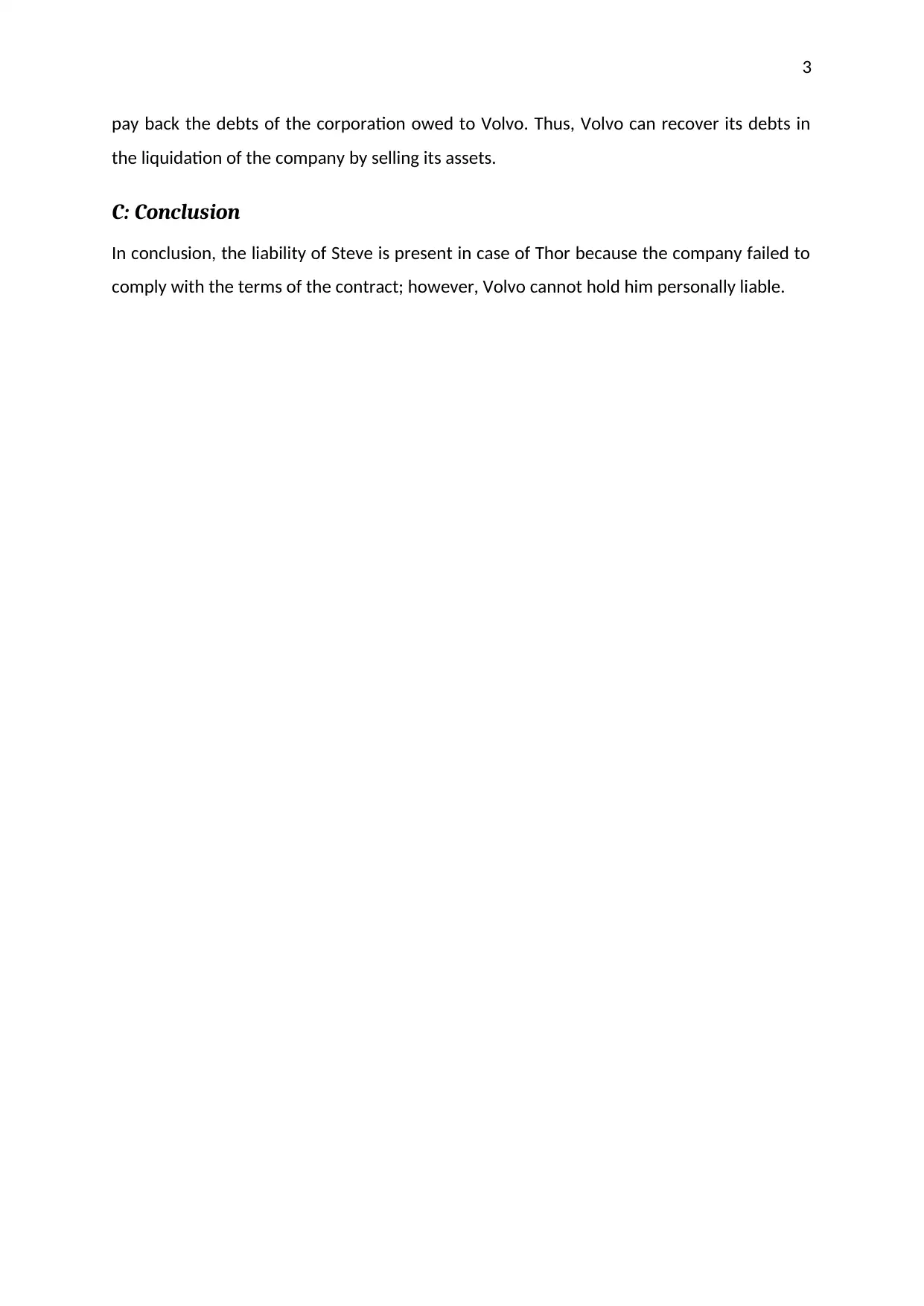
3
pay back the debts of the corporation owed to Volvo. Thus, Volvo can recover its debts in
the liquidation of the company by selling its assets.
C: Conclusion
In conclusion, the liability of Steve is present in case of Thor because the company failed to
comply with the terms of the contract; however, Volvo cannot hold him personally liable.
pay back the debts of the corporation owed to Volvo. Thus, Volvo can recover its debts in
the liquidation of the company by selling its assets.
C: Conclusion
In conclusion, the liability of Steve is present in case of Thor because the company failed to
comply with the terms of the contract; however, Volvo cannot hold him personally liable.
Paraphrase This Document
Need a fresh take? Get an instant paraphrase of this document with our AI Paraphraser
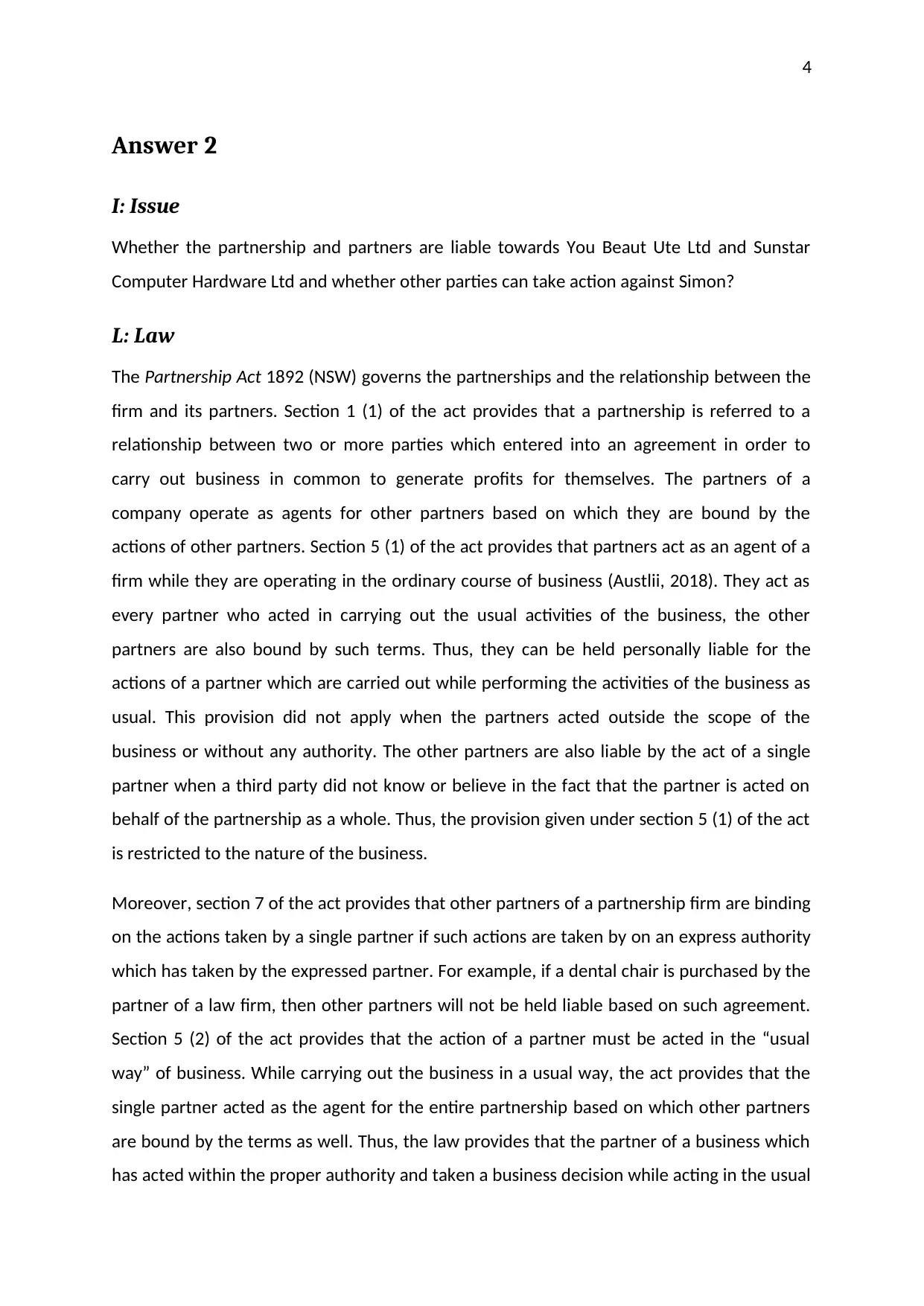
4
Answer 2
I: Issue
Whether the partnership and partners are liable towards You Beaut Ute Ltd and Sunstar
Computer Hardware Ltd and whether other parties can take action against Simon?
L: Law
The Partnership Act 1892 (NSW) governs the partnerships and the relationship between the
firm and its partners. Section 1 (1) of the act provides that a partnership is referred to a
relationship between two or more parties which entered into an agreement in order to
carry out business in common to generate profits for themselves. The partners of a
company operate as agents for other partners based on which they are bound by the
actions of other partners. Section 5 (1) of the act provides that partners act as an agent of a
firm while they are operating in the ordinary course of business (Austlii, 2018). They act as
every partner who acted in carrying out the usual activities of the business, the other
partners are also bound by such terms. Thus, they can be held personally liable for the
actions of a partner which are carried out while performing the activities of the business as
usual. This provision did not apply when the partners acted outside the scope of the
business or without any authority. The other partners are also liable by the act of a single
partner when a third party did not know or believe in the fact that the partner is acted on
behalf of the partnership as a whole. Thus, the provision given under section 5 (1) of the act
is restricted to the nature of the business.
Moreover, section 7 of the act provides that other partners of a partnership firm are binding
on the actions taken by a single partner if such actions are taken by on an express authority
which has taken by the expressed partner. For example, if a dental chair is purchased by the
partner of a law firm, then other partners will not be held liable based on such agreement.
Section 5 (2) of the act provides that the action of a partner must be acted in the “usual
way” of business. While carrying out the business in a usual way, the act provides that the
single partner acted as the agent for the entire partnership based on which other partners
are bound by the terms as well. Thus, the law provides that the partner of a business which
has acted within the proper authority and taken a business decision while acting in the usual
Answer 2
I: Issue
Whether the partnership and partners are liable towards You Beaut Ute Ltd and Sunstar
Computer Hardware Ltd and whether other parties can take action against Simon?
L: Law
The Partnership Act 1892 (NSW) governs the partnerships and the relationship between the
firm and its partners. Section 1 (1) of the act provides that a partnership is referred to a
relationship between two or more parties which entered into an agreement in order to
carry out business in common to generate profits for themselves. The partners of a
company operate as agents for other partners based on which they are bound by the
actions of other partners. Section 5 (1) of the act provides that partners act as an agent of a
firm while they are operating in the ordinary course of business (Austlii, 2018). They act as
every partner who acted in carrying out the usual activities of the business, the other
partners are also bound by such terms. Thus, they can be held personally liable for the
actions of a partner which are carried out while performing the activities of the business as
usual. This provision did not apply when the partners acted outside the scope of the
business or without any authority. The other partners are also liable by the act of a single
partner when a third party did not know or believe in the fact that the partner is acted on
behalf of the partnership as a whole. Thus, the provision given under section 5 (1) of the act
is restricted to the nature of the business.
Moreover, section 7 of the act provides that other partners of a partnership firm are binding
on the actions taken by a single partner if such actions are taken by on an express authority
which has taken by the expressed partner. For example, if a dental chair is purchased by the
partner of a law firm, then other partners will not be held liable based on such agreement.
Section 5 (2) of the act provides that the action of a partner must be acted in the “usual
way” of business. While carrying out the business in a usual way, the act provides that the
single partner acted as the agent for the entire partnership based on which other partners
are bound by the terms as well. Thus, the law provides that the partner of a business which
has acted within the proper authority and taken a business decision while acting in the usual
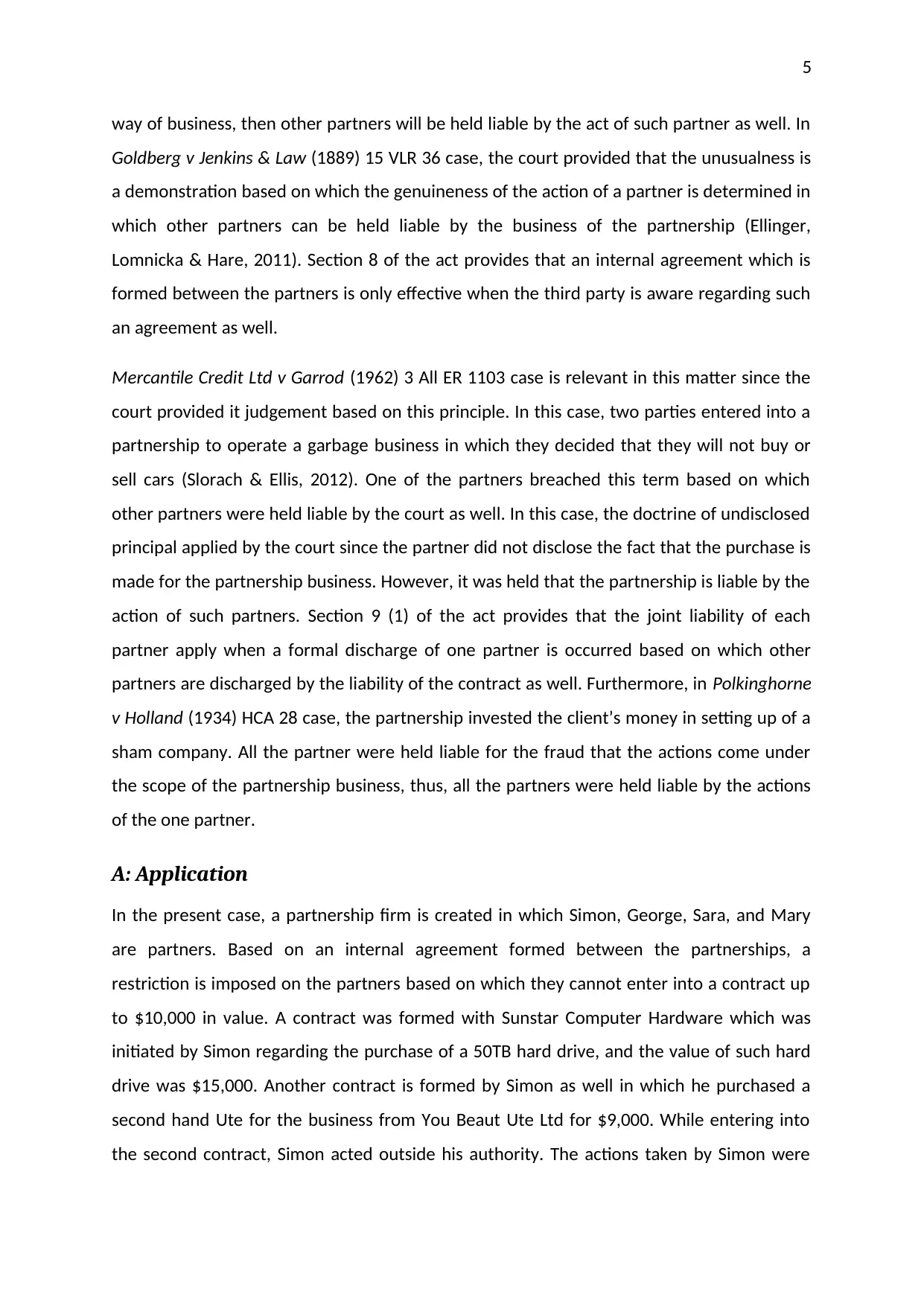
5
way of business, then other partners will be held liable by the act of such partner as well. In
Goldberg v Jenkins & Law (1889) 15 VLR 36 case, the court provided that the unusualness is
a demonstration based on which the genuineness of the action of a partner is determined in
which other partners can be held liable by the business of the partnership (Ellinger,
Lomnicka & Hare, 2011). Section 8 of the act provides that an internal agreement which is
formed between the partners is only effective when the third party is aware regarding such
an agreement as well.
Mercantile Credit Ltd v Garrod (1962) 3 All ER 1103 case is relevant in this matter since the
court provided it judgement based on this principle. In this case, two parties entered into a
partnership to operate a garbage business in which they decided that they will not buy or
sell cars (Slorach & Ellis, 2012). One of the partners breached this term based on which
other partners were held liable by the court as well. In this case, the doctrine of undisclosed
principal applied by the court since the partner did not disclose the fact that the purchase is
made for the partnership business. However, it was held that the partnership is liable by the
action of such partners. Section 9 (1) of the act provides that the joint liability of each
partner apply when a formal discharge of one partner is occurred based on which other
partners are discharged by the liability of the contract as well. Furthermore, in Polkinghorne
v Holland (1934) HCA 28 case, the partnership invested the client’s money in setting up of a
sham company. All the partner were held liable for the fraud that the actions come under
the scope of the partnership business, thus, all the partners were held liable by the actions
of the one partner.
A: Application
In the present case, a partnership firm is created in which Simon, George, Sara, and Mary
are partners. Based on an internal agreement formed between the partnerships, a
restriction is imposed on the partners based on which they cannot enter into a contract up
to $10,000 in value. A contract was formed with Sunstar Computer Hardware which was
initiated by Simon regarding the purchase of a 50TB hard drive, and the value of such hard
drive was $15,000. Another contract is formed by Simon as well in which he purchased a
second hand Ute for the business from You Beaut Ute Ltd for $9,000. While entering into
the second contract, Simon acted outside his authority. The actions taken by Simon were
way of business, then other partners will be held liable by the act of such partner as well. In
Goldberg v Jenkins & Law (1889) 15 VLR 36 case, the court provided that the unusualness is
a demonstration based on which the genuineness of the action of a partner is determined in
which other partners can be held liable by the business of the partnership (Ellinger,
Lomnicka & Hare, 2011). Section 8 of the act provides that an internal agreement which is
formed between the partners is only effective when the third party is aware regarding such
an agreement as well.
Mercantile Credit Ltd v Garrod (1962) 3 All ER 1103 case is relevant in this matter since the
court provided it judgement based on this principle. In this case, two parties entered into a
partnership to operate a garbage business in which they decided that they will not buy or
sell cars (Slorach & Ellis, 2012). One of the partners breached this term based on which
other partners were held liable by the court as well. In this case, the doctrine of undisclosed
principal applied by the court since the partner did not disclose the fact that the purchase is
made for the partnership business. However, it was held that the partnership is liable by the
action of such partners. Section 9 (1) of the act provides that the joint liability of each
partner apply when a formal discharge of one partner is occurred based on which other
partners are discharged by the liability of the contract as well. Furthermore, in Polkinghorne
v Holland (1934) HCA 28 case, the partnership invested the client’s money in setting up of a
sham company. All the partner were held liable for the fraud that the actions come under
the scope of the partnership business, thus, all the partners were held liable by the actions
of the one partner.
A: Application
In the present case, a partnership firm is created in which Simon, George, Sara, and Mary
are partners. Based on an internal agreement formed between the partnerships, a
restriction is imposed on the partners based on which they cannot enter into a contract up
to $10,000 in value. A contract was formed with Sunstar Computer Hardware which was
initiated by Simon regarding the purchase of a 50TB hard drive, and the value of such hard
drive was $15,000. Another contract is formed by Simon as well in which he purchased a
second hand Ute for the business from You Beaut Ute Ltd for $9,000. While entering into
the second contract, Simon acted outside his authority. The actions taken by Simon were
⊘ This is a preview!⊘
Do you want full access?
Subscribe today to unlock all pages.

Trusted by 1+ million students worldwide
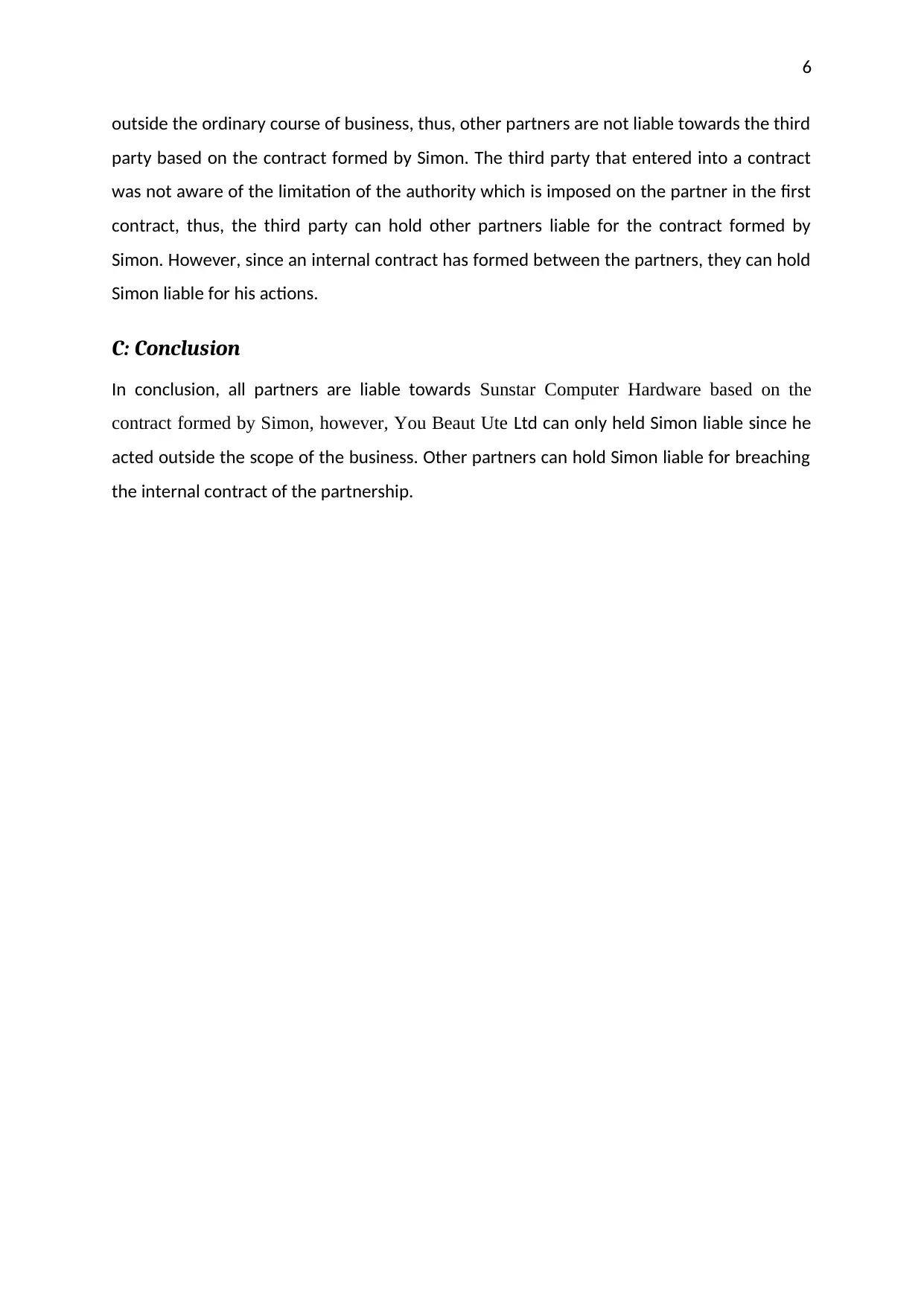
6
outside the ordinary course of business, thus, other partners are not liable towards the third
party based on the contract formed by Simon. The third party that entered into a contract
was not aware of the limitation of the authority which is imposed on the partner in the first
contract, thus, the third party can hold other partners liable for the contract formed by
Simon. However, since an internal contract has formed between the partners, they can hold
Simon liable for his actions.
C: Conclusion
In conclusion, all partners are liable towards Sunstar Computer Hardware based on the
contract formed by Simon, however, You Beaut Ute Ltd can only held Simon liable since he
acted outside the scope of the business. Other partners can hold Simon liable for breaching
the internal contract of the partnership.
outside the ordinary course of business, thus, other partners are not liable towards the third
party based on the contract formed by Simon. The third party that entered into a contract
was not aware of the limitation of the authority which is imposed on the partner in the first
contract, thus, the third party can hold other partners liable for the contract formed by
Simon. However, since an internal contract has formed between the partners, they can hold
Simon liable for his actions.
C: Conclusion
In conclusion, all partners are liable towards Sunstar Computer Hardware based on the
contract formed by Simon, however, You Beaut Ute Ltd can only held Simon liable since he
acted outside the scope of the business. Other partners can hold Simon liable for breaching
the internal contract of the partnership.
Paraphrase This Document
Need a fresh take? Get an instant paraphrase of this document with our AI Paraphraser
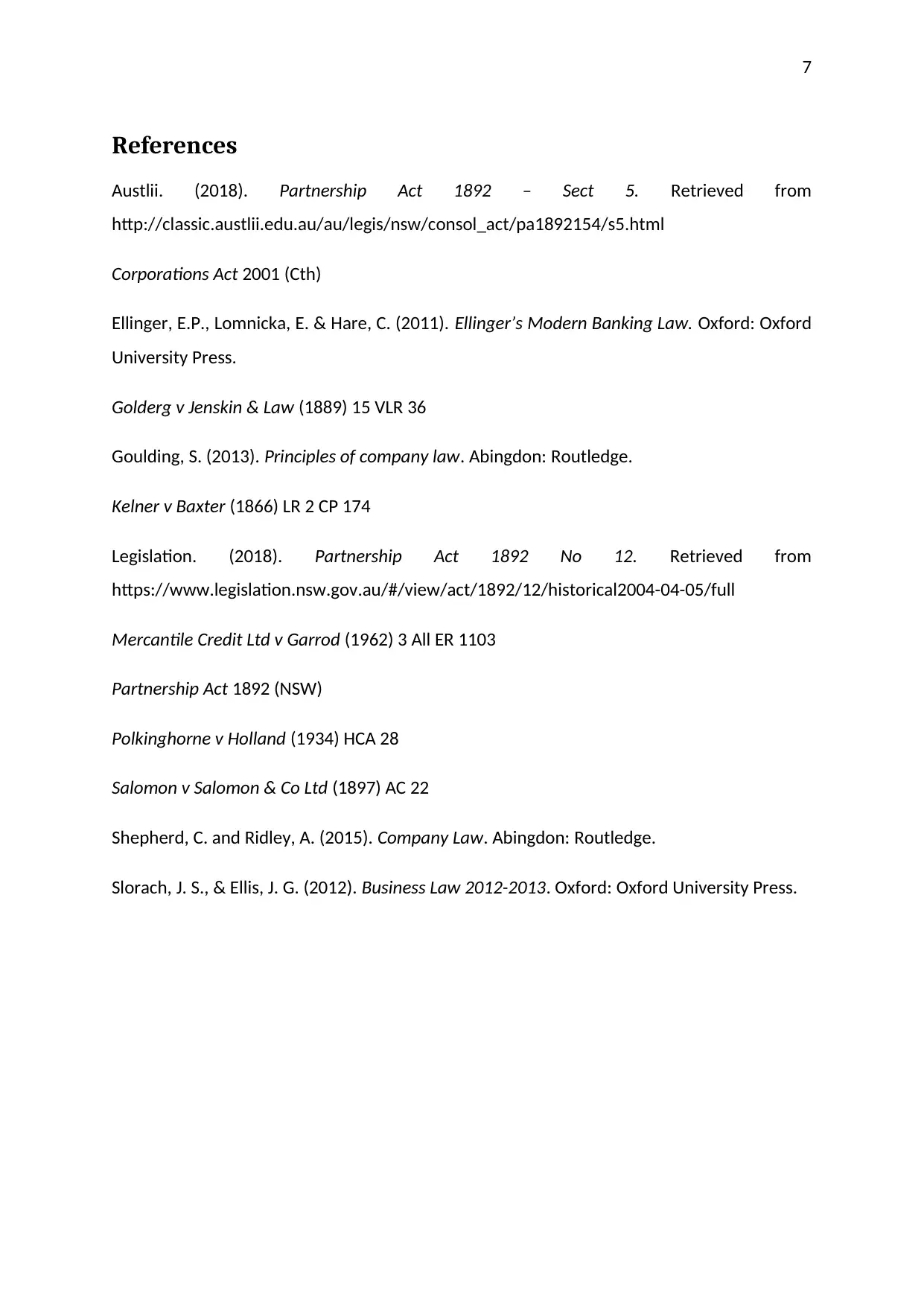
7
References
Austlii. (2018). Partnership Act 1892 – Sect 5. Retrieved from
http://classic.austlii.edu.au/au/legis/nsw/consol_act/pa1892154/s5.html
Corporations Act 2001 (Cth)
Ellinger, E.P., Lomnicka, E. & Hare, C. (2011). Ellinger’s Modern Banking Law. Oxford: Oxford
University Press.
Golderg v Jenskin & Law (1889) 15 VLR 36
Goulding, S. (2013). Principles of company law. Abingdon: Routledge.
Kelner v Baxter (1866) LR 2 CP 174
Legislation. (2018). Partnership Act 1892 No 12. Retrieved from
https://www.legislation.nsw.gov.au/#/view/act/1892/12/historical2004-04-05/full
Mercantile Credit Ltd v Garrod (1962) 3 All ER 1103
Partnership Act 1892 (NSW)
Polkinghorne v Holland (1934) HCA 28
Salomon v Salomon & Co Ltd (1897) AC 22
Shepherd, C. and Ridley, A. (2015). Company Law. Abingdon: Routledge.
Slorach, J. S., & Ellis, J. G. (2012). Business Law 2012-2013. Oxford: Oxford University Press.
References
Austlii. (2018). Partnership Act 1892 – Sect 5. Retrieved from
http://classic.austlii.edu.au/au/legis/nsw/consol_act/pa1892154/s5.html
Corporations Act 2001 (Cth)
Ellinger, E.P., Lomnicka, E. & Hare, C. (2011). Ellinger’s Modern Banking Law. Oxford: Oxford
University Press.
Golderg v Jenskin & Law (1889) 15 VLR 36
Goulding, S. (2013). Principles of company law. Abingdon: Routledge.
Kelner v Baxter (1866) LR 2 CP 174
Legislation. (2018). Partnership Act 1892 No 12. Retrieved from
https://www.legislation.nsw.gov.au/#/view/act/1892/12/historical2004-04-05/full
Mercantile Credit Ltd v Garrod (1962) 3 All ER 1103
Partnership Act 1892 (NSW)
Polkinghorne v Holland (1934) HCA 28
Salomon v Salomon & Co Ltd (1897) AC 22
Shepherd, C. and Ridley, A. (2015). Company Law. Abingdon: Routledge.
Slorach, J. S., & Ellis, J. G. (2012). Business Law 2012-2013. Oxford: Oxford University Press.
1 out of 8
Related Documents
Your All-in-One AI-Powered Toolkit for Academic Success.
+13062052269
info@desklib.com
Available 24*7 on WhatsApp / Email
![[object Object]](/_next/static/media/star-bottom.7253800d.svg)
Unlock your academic potential
Copyright © 2020–2025 A2Z Services. All Rights Reserved. Developed and managed by ZUCOL.





